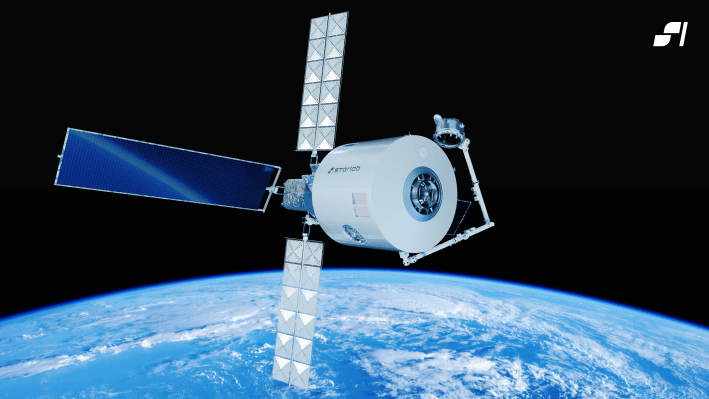Starlab, the private space station being developed by Voyager Space and Airbus, will go to orbit onboard a SpaceX Starship rocket before the decade is out, the companies announced Wednesday.
Starlab is one of a handful of private space station initiatives currently under development. These projects have gained major funding from NASA, under a new initiative called the Commercial Low Earth Orbit Development Program, which is seeking to avoid a critical “space station gap” when the International Space Station is decommissioned in 2030.
The news from Starlab is not exactly a surprise; in a recent interview, Voyager CEO Dylan Taylor said it was always the plan to launch Starlab in a single mission — and Starship is the only heavy-lift rocket under development that will be capable of accommodating the station’s eight-meter-diameter in one go. Taylor added that the decision to launch in one mission also reduces on-orbit risks.
“Let’s say you have a station that requires multiple launches, and then you’re taking the hardware and you’re assembling it [on orbit],” he said. “Not only is that very costly, but there’s a lot of execution risk around that as well. That’s what we were trying to avoid and we’re convinced that that’s the best way to go.”
Voyager and Airbus finalized their Starlab joint venture earlier this month after announcing the plans last August, with the partnership leveraging technical expertise from both companies as well as ties to their respective government space agencies (Airbus is headquartered in Germany, while Voyager, via its operating subsidiary Nanoracks, has extensive experience working with NASA). But because Starlab Space LLC is a transatlantic joint venture, the two companies had to complete various closing reviews, like a review with the Committee on Foreign Investment in the United States (CFIUS), Taylor said.
The joint venture builds on an earlier partnership between the two companies for Airbus to provide “technical support and expertise” for Starlab. While the companies have released scant details about what that expertise includes, Taylor did say that Airbus will be manufacturing the Starlab module in-house — plus any additional Starlabs the joint venture launches into the future.
As of a year ago, Voyager said that Starlab is planned to be launched in 2028; this new announcement on the launch deal with SpaceX included no firm dates, however, and Taylor said the focus is to have Starlab in orbit before the ISS retirement in 2030.
The company said it had a series of design reviews coming up this year that will lead into the Preliminary Design Review (PDR) at the end of this year. The PDR is a critical milestone that establishes that the project meets technical, cost and timeline requirements.
Voyager and its operating subsidiary Nanoracks were awarded a $160 million contract from NASA in December 2021 for the design and development of Starlab; at the time, two other projects — one led by Blue Origin and another by Northrop Grumman — also received funding. However, last October Northrop announced it was abandoning its plans to instead of joining forces with Starlab, to develop rendezvous and docking technology and provide cargo resupply with its Cygnus spacecraft. (That spacecraft just lifted off on its 20th resupply mission to the ISS, so Northrop certainly has the bona fides for the job.)
